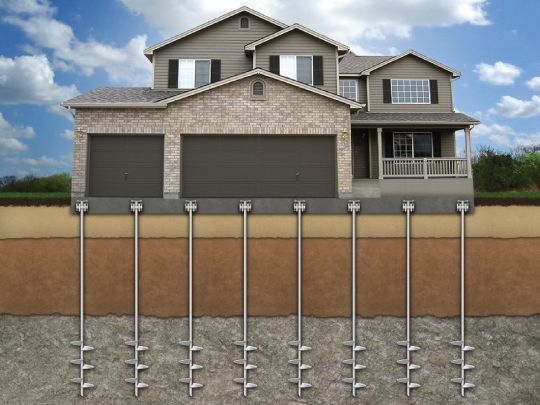
The importance of a strong foundation, ensuring the stability and longevity of your home
A solid foundation is a fundamental element upon which your home stands. It is responsible for bearing the structure’s weight and providing stability and support. Understanding the importance of a strong foundation is essential for homeowners. In this blog post, we will explore the significance of a well-built foundation and its role in ensuring the stability and longevity of your home.
Here are a few factors to consider regarding the structural integrity of a home’s foundation:
Structural integrity is of utmost importance when it comes to the foundation of a home. The foundation provides stability and support to the entire structure, ensuring that it can withstand the weight of the building and resist various forces such as gravity, wind, and soil movement. If the foundation is compromised, it can lead to significant structural issues and pose safety risks to the occupants.
- Foundation Type: There are different types of foundations used in residential construction, including slab-on-grade, crawl space, and basement foundations. Each type has its own requirements for structural integrity, and the design and construction should adhere to local building codes and standards.
- Construction Quality: The foundation should be constructed by experienced professionals using proper techniques and materials. Any shortcuts or substandard workmanship can weaken the foundation’s integrity. It’s crucial to hire reputable contractors who have expertise in foundation construction.
- Soil Conditions: The soil on which the foundation rests plays a significant role in its stability. Different soil types have varying load-bearing capacities and can expand or contract due to moisture changes. Proper soil testing should be conducted before construction to determine the appropriate foundation design and any necessary soil stabilization measures.
- Drainage and Moisture Control: Excessive moisture around the foundation can lead to soil erosion, swelling, and differential settlement, compromising the structural integrity. Adequate drainage systems, such as gutters, downspouts, and proper grading, should be in place to channel water away from the foundation.
- Regular Inspections: It’s essential to conduct regular inspections of the foundation to identify any signs of damage or settlement. Cracks in the foundation walls or floors, uneven floors, sticking doors or windows, or gaps between the foundation and the rest of the structure are potential indicators of foundation issues. If any problems are detected, it’s advisable to consult a structural engineer or a qualified professional for an assessment and appropriate repairs.
- Maintenance: Proper maintenance of the foundation is crucial for its longevity and structural integrity. This includes addressing any moisture-related issues promptly, maintaining the drainage systems, and avoiding excessive vegetation growth near the foundation that could affect the soil’s moisture content.
A strong foundation has a positive impact on the resale value of a home for several reasons:
- Structural Stability: A solid foundation ensures the structural stability of the entire home. Potential buyers are more likely to be attracted to a property with a strong foundation because they know it will provide a solid and secure living environment. A stable foundation reduces the risk of structural issues, such as settling, cracking, or uneven floors, which can be expensive to repair.
- Peace of Mind: A well-built and well-maintained foundation gives buyers peace of mind. They can have confidence that the home’s structural integrity is intact, minimizing the likelihood of future problems and the need for costly repairs. This peace of mind can make the property more appealing and justify a higher resale value.
- Durability: A strong foundation contributes to the overall durability and longevity of the home. Buyers recognize that a solid foundation is a long-term investment, as it provides a reliable base for the entire structure. This perception of durability can positively impact the property’s perceived value and make it more desirable to potential buyers.
- Lower Maintenance Costs: A home with a strong foundation is less likely to experience foundation-related issues over time. This can result in lower maintenance and repair costs for the homeowner. Buyers are often willing to pay a premium for a property with a solid foundation, as it indicates lower future expenses and maintenance requirements.
- Financing and Insurance Considerations: Lenders and insurers often assess the condition of a home’s foundation when determining mortgage rates and insurance premiums. A strong foundation can help facilitate the loan approval process and may lead to more favorable lending terms. Additionally, insurance providers may view a property with a solid foundation as lower risk, potentially resulting in lower insurance costs.
- Market Perception: A property with a strong foundation can create a positive perception in the real estate market. It signals that the home has been well-built and properly maintained, which can attract more buyers and potentially lead to a higher resale value. When evaluating a property’s worth, real estate professionals and appraisers often consider the foundation’s condition.
Protecting your home’s foundation against natural disasters is crucial to ensure its structural integrity and minimize potential damage. Here are some measures you can take to safeguard your foundation:
- Proper Drainage: Implement effective drainage systems to manage water flow around your home. This includes maintaining clean gutters and downspouts, installing downspout extensions or splash blocks to divert water away from the foundation, and ensuring proper grading around the house to encourage water runoff.
- Foundation Waterproofing: Apply waterproof coatings or sealants to the exterior of the foundation walls. This helps prevent water intrusion during heavy rains or flooding. Additionally, consider installing a foundation drainage system, such as a French drain or a sump pump, to remove excess water from around the foundation.
- Landscape Design: Plan your landscaping strategically to protect your foundation. Avoid planting large trees near the house, as their roots can potentially damage the foundation over time. Opt for smaller shrubs and plants that have less aggressive root systems. Maintain a proper distance between plants and the foundation and ensure that the soil slopes away from the house to prevent water accumulation.
- Reinforcement: In areas prone to earthquakes, reinforcing your foundation can help protect against seismic activity. Consult with a structural engineer to evaluate the need for additional reinforcement, such as anchor bolts or shear walls, to enhance the foundation’s ability to withstand lateral forces.
- Flood Prevention: If you live in a flood-prone area, consider implementing flood prevention measures. This may include installing flood barriers or flood vents to prevent water from entering the home’s lower levels. Elevating critical utilities and appliances above potential flood levels can also minimize damage to the foundation.
- Wind Protection: In regions with high wind speeds or hurricanes, reinforcing the home’s overall structure is crucial. Ensure that the roof, walls, and windows are properly designed and constructed to withstand strong winds. When severe weather is expected, secure outdoor furniture and objects that could become projectiles, potentially damaging the foundation or other parts of the house.
- Insurance Coverage: Review your homeowners’ insurance policy to ensure it adequately covers potential foundation damage caused by natural disasters. Consider additional coverage options for specific risks like earthquakes or floods.
A strong foundation is the cornerstone of a safe, stable, and long-lasting home. It is crucial for homeowners to understand its importance and take proactive measures to ensure its integrity. By prioritizing a robust foundation through proper construction, regular inspections, and timely repairs, you can protect your investment, enhance your home’s safety, and enjoy peace of mind for years to come.



